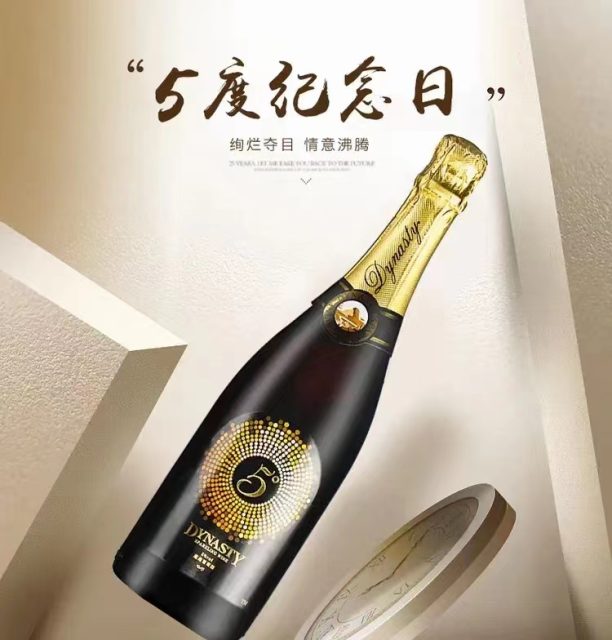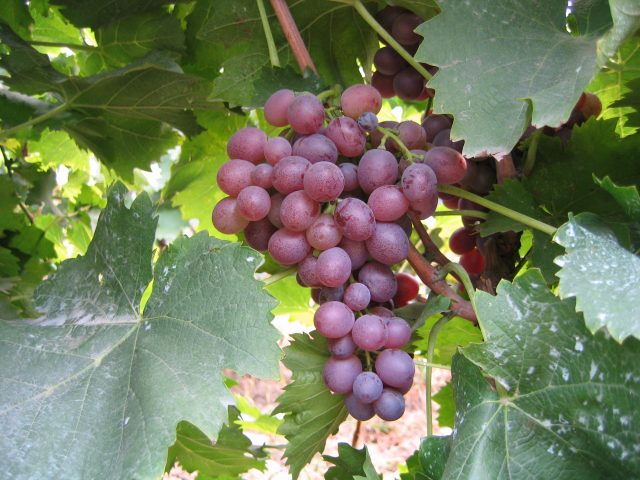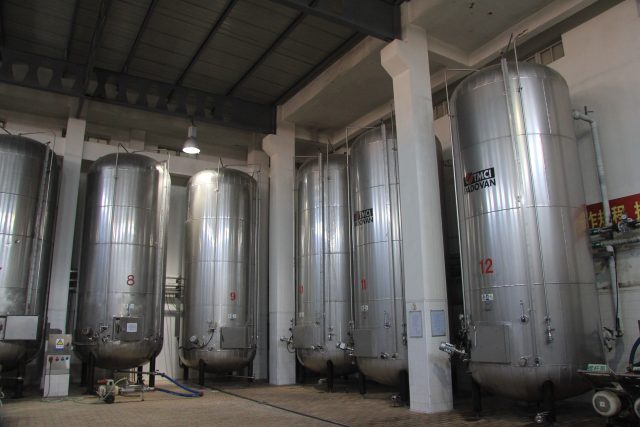This website uses cookies so that we can provide you with the best user experience possible. Cookie information is stored in your browser and performs functions such as recognising you when you return to our website and helping our team to understand which sections of the website you find most interesting and useful.
Making a Master: Dynasty 5° Sparkling Wine
As part of db’s ‘Making a Master’ series, we explore the Dynasty 5° Sparkling Wine, Master medallist in the Asian Sparkling Masters 2023.

Founded in 1980, Dynasty Wines is an intriguing collaboration. The partnership is between local vineyards, the Tianjin government and international wines and spirits behemoth Rémy Martin. Its range of red, white and sparkling wines, as well as Cognac-inspired brandies, has grown it into one of the country’s most important producers. As domestically produced wine still dominates the sizeable Chinese market, it is a significant position to hold.
The Dynasty 5° Sparkling Wine is an ideal ambassador for the brand, having won a Master medal at the Asian Sparkling Masters 2023. The wine uses Muscat Hamburg and undergoes its alcoholic fermentation and carbon dioxide fermentation in pressurised tanks.
There are echoes of European viticulture in the product. Muscat Hamburg is a deep purple-skinned English variety, well-suited to greenhouses and beloved by Victorian farmers. As a low-alcohol, aromatic sparkling wine, there are also parallels with Asti’s Moscato.
However, sourcing from some of China’s top regions, it is a distinctly Chinese expression. The key challenge for the winemakers is to reveal fully the regional characteristics of Tianjin’s aromatic Muscat.

The Muscat grows in Hangu, an area of Tianjin municipality bordering the Bohai Sea, the Yellow Sea’s innermost part. Here, the region has four distinct seasons with a humid climate. The grapes experience a broadly warm climate with abundant sunlight, heat and water, but the cooler autumns promote freshness.
The alkaline coastal soils likewise promote acidity, while being rich in nutrients for sugar production. The unique coastal saline-alkali clay soil is also rich in a well-balanced array of minerals, including phosphorus, potassium and magnesium. These are ideal for the development of Muscat’s potential, contributing to a richer style of sparkling wine.
The awarding-winning expression is born of the idea that a wine is only as good as its balance. Balance is reflected in many aspects: for instance, the balance between the rich rose fragrance and the deep, elegant baked aromas; or the pleasant balance between sweetness and acidity. According to the winemaker, “balance is indeed a delicate art. What it emphasises is that the various elements of wine complement each other and jointly shape the unique style and charming flavour of the wine.”
The fermentation is with the Charmat method, meaning second fermentation under low-temperature control in a fully automatic pressurised tank. The technique, which earned a national invention patent in China, retains the floral and fruity aromas of the Muscat grapes to the greatest extent.
After that, the wine undergoes ageing sur lie in the fully automatic pressurised tank, adding complexity and roundness. The amount of time spent ageing sur lie varies year on year, depending on the grapes picked that vintage and the intended quality and flavour of the wine. Through the ageing process, both consistency and the desired flavours are maintained. The yeast autolysis brings richer, bready aromas and a sense of structure to wine; added layers of ageing to the wine’s complex profile.

How to make a Master
Below, db spoke with the winemaking team at Dynasty Wines to explore some of the crucial decisions behind the Master-winning Dynasty 5° Sparkling Wine.
Q: Many readers will not be familiar with your wine regions. What makes Tianjin Muscat so special?
The suitable rainfall, sufficient sunlight, abundant heat, cool autumns and other climatic factors in the Hangu production area of Tianjin fully meet the requirements of the Muscat variety. Likewise, the nutritionally comprehensive and slightly alkaline coastal soil fully meets its needs. These factors improve the potential quality of the variety, letting it perform to its fullest. This makes Hangu, Tianjin, the most famous Muscat production area in China, or even the world.
The Muscat grapes harvested in this area have rich aromas; harmonious sugar and acidity; and a juicy and refreshing taste. They have won first place in China’s table grape competition many times. The region’s wines made from Muscat grapes have also garnered many international gold medals, reflecting the area’s typical characteristics.
Q: As a non-vintage fizz especially, consistency is key. How do you work around vintage variation?
As an agricultural product, grapes are affected by factors such as the surroundings, climate, environment and soil. This means their performance is inconsistent every year. For the sake of product consistency, and in order to obtain the best quality grape raw materials, we determine the most suitable harvest period for Muscat each year based on the specific weather conditions each year.
We also determine the most suitable fermentation and the ageing processes each year. The ageing time sur lie depends on the specific situation. Our professional wine makers taste regularly to determine the best ageing time, usually for 3 to 6 months.
Q: How would you describe making the wine in one sentence?
Dynasty is committed to brewing a high-quality product that exudes harmonious and elegant aromas, accompanied by foamy fizz to offer to wine lovers.
Dynasty 5° Sparkling Wine

Tasting notes taken from the judges at the Asian Sparkling Masters 2023.
“A deep gold wine, full of aromas of honey, ripe plum, sweet apricot and dried nuts. The wide range of flavours balances against youthful, fresh acidity for a complex wine.”

